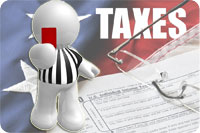
Typically, the severity of tax penalties assessed depends on the violation at stake. Taxes are generally assessed by computers, that in many cases, don’t understand the circumstances that led up to the noncompliance. There are many situations where tax penalties can be removed if it can be shown that there was “reasonable cause” that didn’t allow for the taxpayer to remain in compliance. Below are details on the most common tax penalties the IRS charges. Many states have adopted similar penalties to the IRS but tax penalties do differ from state to state.

Penalties for Unfiled Taxes
Unfiled Taxes with No Taxes Owed
If you or your business does not owe taxes, it is still in your best interests to file. Typically, there are no tax penalties charged if the taxpayer does not owe taxes but there are other possible consequences and sometimes penalties. If a taxpayer is owed a refund, the refund cannot be claimed until a tax return is filed. If three years has passed since the due date of the tax return, the IRS is no longer required to pay the taxpayer the refund. If the IRS believes that the taxpayer owes extra money (even if they do not), they will file a “substitute return,” which is also called an SFR or Substitute for Return. The IRS and many states will use the information they have on hand to file the tax return and may leave off certain tax deductions or tax credits that the taxpayer would normally claim or deduct. Therefore, if the IRS does complete a substitute return, in many cases the IRS and certain states will come up with a tax balance owed and add on additional penalties.
Penalties for Filed but Unpaid Taxes
The IRS charges penalties at a much lower rate if taxes are filed and not paid vs. taxes being unfiled and not paid. The penalty for unpaid taxes is called the failure-to-pay penalty. The failure-to-pay penalty is charged at a rate of .5% for each month that the tax remains unpaid after the tax filing due date. The maximum penalty that can be charged is 25% of the tax liability.
If the taxpayer enters into an IRS payment plan with the IRS the penalty amount drops to .25% a month.
Unfiled Taxes with Taxes Owed
The IRS charges some of the harshest penalties to taxpayers that owe taxes and either do not file or who file late. The penalty that is charged is called the failure-to-file penalty. This penalty is charged at a rate of 5% for each month or part of the month that the tax return remains unfiled and unpaid. The maximum penalty that can be charged is 25% of the tax liability. If the tax return is over 60 days late the minimum penalty will be the lesser of $135 or 100% of the tax liability.
If the taxpayer does not take the initiative to file a tax return the IRS will eventually file a substitute tax return on their behalf in order to assess a tax liability and begin charging penalties.
If it can be proven that the failure to file was willful or fraudulent the IRS may charge a civil penalty. The civil penalty is charged at a rate of 15% a month with a maximum of 75% of the tax amount owed. In rare circumstances, the IRS has the right to charge criminal penalties to those taxpayers who willfully fail to file or pay their taxes on time. If the taxpayer is found guilty, they can be fined $25,000 and sentenced to one year in prison (rare).
Interest Charged on Unpaid Taxes
In addition to tax penalties, the IRS also charges interest on unpaid tax liabilities. The interest that the IRS charges is determined by the federal short-term rate, which changes quarterly. They charge the federal short-term rate plus 3%. Currently, as of Q4 2015 the interest rate the IRS is charging is 3% for underpayments for individual taxpayers.
Getting Help With IRS or State Tax Penalties
Every taxpayer’s situation is unique, depending upon the type of taxpayer (business or individual) and their financial situation. There are situations where a taxpayer’s penalties can be dropped significantly or even completely eliminated. Our tax professionals will do an in-depth analysis of your situation to determine the best approach. Below are some possible services we can offer you to help with your tax penalties.
If you have unfiled tax returns our tax professionals will file these as soon as possible to minimize penalties while ensuring you get the maximum tax deductions.
If the IRS filed a substitute return on your behalf or we notice errors with a prior tax filing we will file an amended tax return in order to minimize the tax amount owed as well as reduce the penalties that were charged.
The IRS generally will give you one year of penalty abatement starting with the first year you became uncompliant. Beyond the 1 year, we will determine if you have “reasonable cause,” or valid reasons for not staying in compliance. If you do have valid reasons, additional years of penalties could be abated.
If you cannot pay the total amount of tax owed in full, we will determine the best possible settlement for your unique situation. This can be done by entering into an installment agreement and paying back in monthly increments or possibly settling taxes for less through an offer in compromise.
Contact Us for Help With an IRS or State Tax Levy
Our tax professionals can assess your situation and figure out the best method to get your levy released. We will work on your behalf to negotiate the arrangement that works best for you, not the taxing authorities.
Get Started Now with a free case review.
